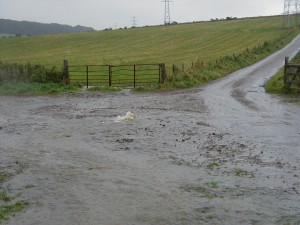Pollution
The Scottish Environmental Protection Agency (SEPA) have classified Tarland waterbody as achieving Moderate ecological status in 2008 and have a target of Good status for 2015. The specific pressures identified were (i) diffuse pollution from mixed farming and (ii) straightening and deepening the stream channels (termed cannelization). There have been instances of low classification for macroinvertebrates, fish, macrophytes, overall chemistry and priority substances. As part of the management plan for this catchment the whole of the River Dee has been designated a Priority Diffuse Pollution Catchment by SEPA. As part of their national diffuse pollution strategy SEPA will undergo a programme of ‘catchment walks’ and visits for one-to-one advice. This forms part of an intensive national campaign covering 45 catchments over the next decade.
The typical pressures associated with diffuse pollution include sediment and particulate Phosphorous losses to the river. These issues have been tackled by the use of riparian buffer strips and fencing off of stream watering points for cattle. However, the issues are not all with farming land use. There are a large number of houses which are not on the public waste water treatment system. These properties, out of the village are serviced by private septic tanks of which there are thought to be a large number. It is hoped that the publication and introduction of the good septic tank guide will help to address this issue.
Category: Pollution








